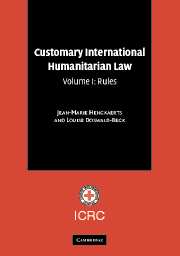Book contents
- Frontmatter
- Contents
- Foreword by ICRC President Jakob Kellenberger
- Foreword by Judge Abdul G. Koroma
- Foreword by Yves Sandoz
- Acknowledgements
- Introduction
- List of abbreviations
- Part I The Principle of Distinction
- Part II Specifically Protected Persons and Objects
- Part III Specific Methods of Warfare
- Part IV Weapons
- Part V Treatment of Civilians and Persons Hors De Combat
- Chapter 32 Fundamental Guarantees (Rules 87–105)
- Chapter 33 Combatants and Prisoner-of-War Status (Rules 106–108)
- Chapter 34 The Wounded, Sick and Shipwrecked (Rules 109–111)
- Chapter 35 The Dead (Rules 112–116)
- Chapter 36 Missing Persons (Rule 117)
- Chapter 37 Persons Deprived of Their Liberty (Rules 118–128)
- Chapter 38 Displacement and Displaced Persons (Rules 129–133)
- Chapter 39 Other Persons Afforded Specific Protection (Rules 134–138)
- Part VI Implementation
Chapter 36 - Missing Persons (Rule 117)
Published online by Cambridge University Press: 05 June 2012
- Frontmatter
- Contents
- Foreword by ICRC President Jakob Kellenberger
- Foreword by Judge Abdul G. Koroma
- Foreword by Yves Sandoz
- Acknowledgements
- Introduction
- List of abbreviations
- Part I The Principle of Distinction
- Part II Specifically Protected Persons and Objects
- Part III Specific Methods of Warfare
- Part IV Weapons
- Part V Treatment of Civilians and Persons Hors De Combat
- Chapter 32 Fundamental Guarantees (Rules 87–105)
- Chapter 33 Combatants and Prisoner-of-War Status (Rules 106–108)
- Chapter 34 The Wounded, Sick and Shipwrecked (Rules 109–111)
- Chapter 35 The Dead (Rules 112–116)
- Chapter 36 Missing Persons (Rule 117)
- Chapter 37 Persons Deprived of Their Liberty (Rules 118–128)
- Chapter 38 Displacement and Displaced Persons (Rules 129–133)
- Chapter 39 Other Persons Afforded Specific Protection (Rules 134–138)
- Part VI Implementation
Summary
Rule 117. Each party to the conflict must take all feasible measures to account for persons reported missing as a result of armed conflict and must provide their family members with any information it has on their fate.
Practice
Volume II, Chapter 36, Section A.
Summary
State practice establishes this rule as a norm of customary international law applicable in both international and non-international armed conflicts. The obligation to account for missing persons is consistent with the prohibition of enforced disappearances (see Rule 98) and the requirement to respect family life (see Rule 105). This rule is also supported by the obligation to record all available information prior to disposal of the dead (see Rule 116). The rules cross-referred to here all apply in both international and non-international armed conflicts.
International and non-international armed conflicts
The Geneva Conventions provide for the setting up of Information Bureaux whose role it is to centralise information on prisoners of war and civilians belonging to an adverse party, to transmit such information to that party and to open inquiries in order to elucidate the fate of missing persons. The Fourth Geneva Convention requires that parties to the conflict facilitate enquiries by persons looking for family members dispersed by the conflict. Additional Protocol I requires each party to the conflict to search for persons who have been reported missing by the adverse party. The obligation to account for missing persons is recognised in numerous agreements between parties to both international and non-international armed conflicts.
- Type
- Chapter
- Information
- Customary International Humanitarian Law , pp. 421 - 427Publisher: Cambridge University PressPrint publication year: 2005
- 1
- Cited by

